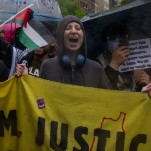Wife of Saudi Blogger Sentenced to 1,000 Lashes Comes to the U.S. to Fight for His Release
LatestEnsaf Haidar hasn’t seen her husband since 2012, but “the nightmare” as she calls it, began eight years ago, when her husband Raif Baidawi was first summoned by Saudi Arabian authorities for questioning about his blog. Badawi has since been sentenced to 10 years in prison for the crime of blogging, as well as 1,000 lashes. It’s a punishment that Haidar, the mother of his three children, fears will kill him.
“Our life before the arrest was great, even more than great,” she told Jezebel quietly on Thursday afternoon during an interview at Amnesty International’s New York offices. Haidar is small and very slight, barely clearing five feet tall even in a stacked set of heels. She is 35 but would look, at times, like a teenager, if it weren’t for the evident grief in her face. She spoke in Arabic, with a translator carefully taking notes.
“Our life was almost perfect,” she said, cracking a half-smile. “Maybe I’m the only one who saw life like this, but really he’s a wonderful father and perfect husband.” He would even vacuum and help with the children, she added, which is unusual for Saudi men.
“That’s exactly why she thinks he’s a perfect husband,” the female translator explained, with a sad smile. “They were co-parents.” Haider has previously described her husband as her “best friend.”
The couple were married in 2002. In 2007, Badawi launched his blog, “Free Saudi Liberals.” The blog openly questioned Saudi Arabia’s religious leadership, and bloggers and commenters debated religion’s role in public life. She told Jezebel Thursday that her husband is a passionate advocate for the rights of women, and wrote frequently about their restricted legal rights.
“He identified as pro-women’s rights and feminism,” she said. “That is how it’s supposed to be. Women and men should have the same rights.”
It didn’t take long Badawi was summoned for questioning by government authorities. They were particularly concerned with whether he’d mocked the the Commission on the Promotion of Virtue and Prevention of Vice, the country’s religious police.
By 2008, Badawi was being investigated for “apostasy,” a crime which for men is punishable by death by beheading. He was detained for one night that year and released. By 2009, the government had frozen his assets and barred him from traveling abroad.
Ensaf Haidar and the couple’s three small children—two girls and a boy—applied for asylum with the United Nations in 2012 and fled to Canada. The same year, Badawi was arrested, and hasn’t seen his family since. While prosecutors couldn’t ultimately make the apostasy charge stick, Badawai was tried and convicted for disobeying his father (a crime in Saudi Arabia; the man reportedly went on TV to denounce his son), breaking technology laws, and insulting Islam. He initially received seven years in prison and six hundred lashes as a sentence; when prosecutors deemed that too light, they successfully retried him in 2014, winning the new sentence of 10 years in prison, 1,000 lashes, and a fine of 1 million riyals or about $266,600. His blog, obviously, was shut down.
-

-

-

-

-

-

-

-

-

-

-

-

-

-

-

-

-

-

-

-

-

-

-

-

-

-

-

-

-

-

-

-

-

-

-

-

-

-

-

-







































